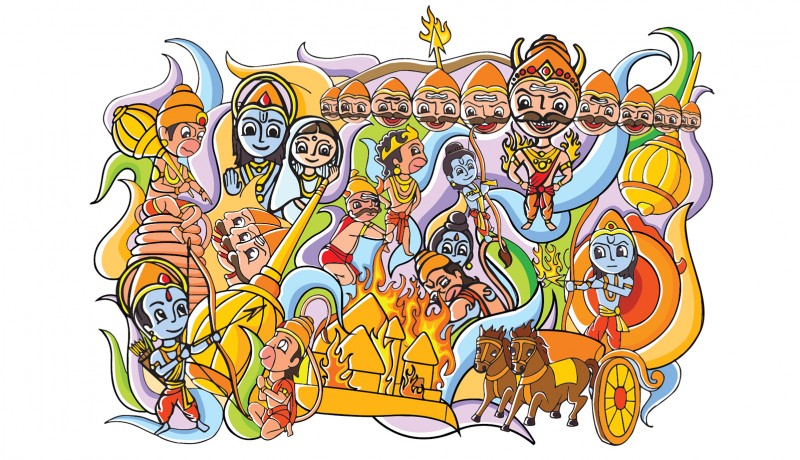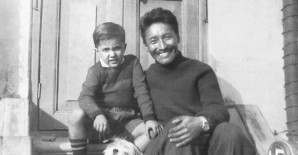
Columns

On the occasion of Diwali, Shubha Vilas dwells upon some takeaways from the Ramayana
The most treasured memory of my childhood is associated with my grandmother. Every single night she would put me to sleep while narrating the Ramayana. The epic slowly cast a spell on me, so much so that I would keenly look forward to story time to hear what my grandmother would say about the characters and situations from the tale. I had probably heard the Ramayana a few hundred times, repeatedly over and over again. But every time I heard it afresh, the excitement only grew.
The initial seed sowed by my grandmother grew into a huge tree by the time I turned 30, as I delved into an intense study of the epic. I developed a desire to retell the epic in an authentic but modern way. In my six-volume series, Ramayana: The Game of Life, I have attempted a gripping narrative of the story, along with life lessons that can be inculcated from it. When the first book in the series became a bestseller, I silently thanked my grandmother and dedicated the second book to her. Who says the wisdom of a simple old woman cannot change the destiny of the next generation?
I would like to share six lessons I imbibed from the story that forms the backdrop of Diwali, the festival of lights. It’s unfortunate that most people choose to float on the ritual of the festival rather than delve into its essence. Most of us celebrate festivals with mechanical enthusiasm rather than essence-based awareness. The question shouldn’t be whether we enjoyed the festival, but whether we were uplifted by it.
Interestingly, almost every festival in the world is born to commemorate the sacrifice of some divine personality. Janmashtami celebrates the sacrifice of Vasudev and Devaki as much as it signifies the birth of Krsna. Diwali acknowledges the sacrifice of Rama, Lakshmana, Bharata and Sita as much as it rejoices in their return to Ayodhya. Christmas commemorates the sacrifice of Jesus Christ as much as it marks his birth. Dusshera speaks of the sacrifice of Vibhishan as much as it celebrates the victory of Rama over Ravana. Independence Day pays tribute to the martyrs as much as it observes the nation’s freedom from domination by foreign powers.
The question now is, if someone’s hard work and sacrifice are celebrated as a festival, what should be our role in it? Do these dates on the calendar mark freedom from work or do they actually signify opportunities to achieve freedom from selfishness? Should we dilute it by our frivolousness or uphold its sanctity by genuine appreciation and active gratitude? Being not in sync with the mood of the festival is like going to a funeral ceremony not for contemplating on the good qualities of the departed but for using it as a networking opportunity.
When a festival is celebrated, it brings smiles of joy; but when a festival is contemplated, it brings tears of gratitude. Celebration with contemplation uplifts and inspires us, while empowering and infusing us with the mood of respect and sacrifice. When a festival is celebrated, money is spent, but when a festival is contemplated, blessings are earned!
Let this Diwali usher six sparklers into our lives:
Determination
The 14 years of struggle Rama underwent reveals his determination to install the right values in the hearts of Ayodhya’s citizens. Though wronged, Rama still followed the orders of his father who was then the king of Ayodhya. He wanted to show the citizens what it meant to be an ideal follower before becoming an ideal leader. Even though many tried to undo his decision, Rama was determined to show the right conduct of an ideal follower.
Illumination
The lights in every nook and corner of Ayodhya indicated a promise by the citizens to take decisions in the light of knowledge and clarity, and not emotional darkness. The decision to banish Rama and crown Bharata was taken not just in the darkness of the night but the dark environment created by Keikeyi under the influence of Manthara. While the whole of Ayodhya slept, that dark plot was hatched. Fourteen years later when Rama returned, the whole city was lit up to indicate that the light of knowledge would prevail henceforth.
Winning
With his actions, Bharata showed that winning hearts is more important than winning thrones. Relationships have to be prioritised over resource-ships. He was given the throne of Ayodhya on a golden platter. But Bharata chose the tough path of trying to locate Rama and the even tougher path of trying to convince him to return to Ayodhya to take charge. Bharata prioritised his relationship with his brother over an opulent kingdom.
Accommodation
When Rama was returning to Ayodhya, he borrowed the Pushpak Vimana from Vibhishan because he had to traverse a huge distance back to Ayodhya in one night. Rama invited all the he-monkeys to join him in the plane. Sensing Rama’s desire, the Pushpak Vimana expanded to accommodate so many. When they reached the vicinity of Kishkinda, Sita expressed her desire that along with the he-monkeys, it was only fair that the she-monkeys be allowed to come to witness the coronation ceremony in Ayodhya. Naturally, Rama agreed and the she-monkeys boarded the plane, which expanded even further to accommodate the new entrants. So far, Ravana had used the Pushpak Vimana only for solo pleasure rides and now Rama was accommodating so many. Every time more people entered it, the plane expanded to create more space. The ability to accommodate all kinds of people in our lives comes from the desire to accommodate.
Letting go
Rama did not tolerate any insult to Keikeyi and made sure no one referred to the past even subtly and sarcastically. He decided to let go of the past. In fact, he gave her more attention and love than ever before. Letting go of others’ lapses is the best way to herald a change.
Indebtedness
During the coronation, Rama noticed tears in Sita’s eyes. When he asked her, she said the red colour sprinkled in the air as part of the celebrations reminded her of Jatayu’s blood. She reminded Rama that their success was built on the sacrifices of so many heroes. Be grateful while celebrating, knowing that your success is owing to the sacrifices of many.
Photo: 123RF.com Featured in Harmony — Celebrate Age Magazine October 2017
you may also like to read
-
Mental workout
Mukul Sharma tells you how to keep those grey cells ticking Everyone will ultimately lose his or her brain….
-
Helpline
Dr Harshbir Rana answers your queries on personal and social issues related to ageing, elder care and intergenerational relationships ….
-
Off the cuff
Raju Mukherji pays tribute to his first hero, Tenzing Norgay, an exemplary mountaineer Darjeeling, 1955. Dr ‘Pahari’ Guha Mazumdar….
-
Yoga RX
Shameem Akthar shows ways to control debilitating ankle pain through regular practice Ankle pain is so common and prevalent….








